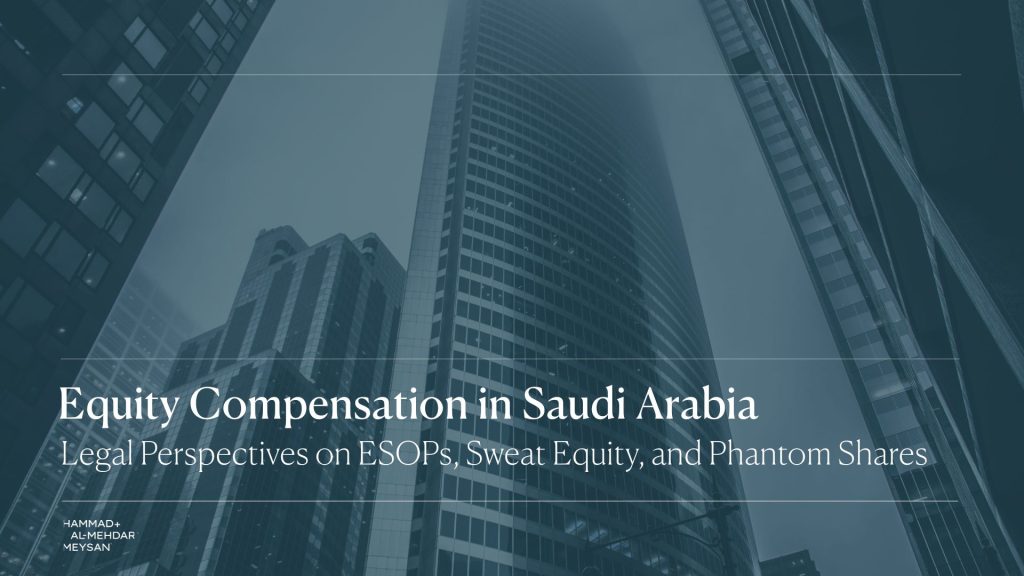
In an increasingly competitive employment landscape, Saudi companies are turning to equity-based compensation mechanisms as a strategic tool to attract, incentivise, and retain high-calibre talent. While traditional salary structures remain foundational, the introduction of innovative reward mechanisms such as Employee Stock Ownership Plans (ESOPs), sweat equity, and phantom share arrangements has emerged as a compelling differentiator—particularly in the startup and growth-stage ecosystem.
At Hammad & Al-Mehdar Law Firm, we frequently advise clients on how to implement equity-based incentives in line with local legal frameworks and corporate governance requirements. Below, we explore the legal underpinnings, structuring considerations, and common challenges for each mechanism within the Saudi Arabian context.
Navigating the Available Options:
Saudi companies evaluating equity-based compensation generally consider one of three mechanisms:
- ESOPs,
- Sweat Equity, and
- Phantom Shares.
Each provides distinct benefits, legal obligations, and implications for ownership structure, requiring careful evaluation aligned with company type, commercial goals, and regulatory obligations.
Employee Stock Ownership Plans (ESOPs)
ESOPs are perhaps the most recognisable form of equity compensation. Under these plans, employees are offered company shares—either at a preferential rate or as part of their total compensation package. ESOPs aim to align employee and shareholder interests, fostering a culture of long-term ownership and performance.
Legal Considerations:
- For publicly listed companies, ESOP implementation is governed by the Capital Market Authority (CMA) and subject to approval under specific regulations concerning share allocation and disclosure.
- Private companies may face challenges around share valuation and structuring, and must ensure compliance with corporate governance frameworks under the Saudi Companies Law.
- Vesting schedules are a key feature. These are often structured over four years, with a one-year cliff, ensuring sustained employee commitment.
Sweat Equity
Sweat equity allows companies—particularly startups and early-stage firms—to compensate employees or co-founders for non-financial contributions such as strategic expertise, innovation, or market development.
Legal Considerations:
- Saudi Companies Law permits sweat equity under certain conditions, subject to shareholder approvals and disclosure requirements.
- Valuation of such contributions remains a complex area, particularly in the absence of formal cash investment.
- Structuring must reflect fair market value and be supported by robust documentation to pass legal scrutiny.
Phantom Shares
Phantom share schemes offer a contractual right to receive cash payouts equivalent to the value of real equity—without conferring actual ownership. These are particularly attractive for companies seeking to avoid equity dilution while still rewarding performance.
Legal and Structural Considerations:
- Phantom shares are not regulated by specific provisions under Saudi law, granting significant flexibility in how companies draft and implement such plans.
- They are commonly used by Limited Liability Companies (LLCs) and provide no shareholder rights or voting entitlements.
- Key structuring elements include clear valuation mechanisms, performance conditions, and payout timelines.
Phantom share plans typically fall under two categories:
- Full Value Plans – the employee receives a payout equal to the full share value at a future date or upon meeting a target.
Appreciation-Only Plans – employees benefit only from the increase in share value from a set base price, thus limiting the company’s financial exposure. - Corporate Structures and Regulatory Implications:
The choice of equity incentive must be aligned with a company’s legal structure:
Simplified Joint Stock Companies (SJSCs): May issue shares to employees or grant options to acquire shares, provided the Articles of Association authorise it and buy-back provisions are in place.
Limited Liability Companies (LLCs): Cannot issue shares in the traditional sense but often implement phantom share or profit-sharing schemes structured through private contracts.
These arrangements must be carefully drafted to ensure enforceability and alignment with Saudi corporate and tax laws.
Shareholder Protections and Exit Mechanics
While equity compensation encourages ownership behaviour, it also introduces complexities in managing shareholder rights and transfers. Two key legal mechanisms often embedded into share agreements include:
- Pre-emptive Rights: Allow existing shareholders to purchase additional shares before they are offered externally.
- Right of First Refusal (ROFR): Ensures the company or existing shareholders have the first opportunity to buy shares offered for sale by an employee.
These provisions help preserve the integrity of the shareholder base while maintaining a robust incentive structure.
Equity-based compensation schemes are a powerful tool for fostering loyalty, performance, and long-term value creation—but they must be structured thoughtfully and in strict compliance with Saudi law. Each mechanism—ESOPs, sweat equity, and phantom shares—requires bespoke legal planning, especially regarding governance, valuation, taxation, and contractual enforceability.
At Hammad & Al-Mehdar, we support clients in structuring equity compensation strategies tailored to their operational models, growth stage, and governance requirements. Our experience spans startups, family businesses, and publicly listed firms, ensuring regulatory clarity and strategic alignment across all engagement stages.
For legal advice on equity incentive structuring or to explore tailored solutions for your organisation, contact our team.
